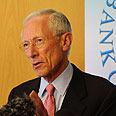
Bank of Israel Governor Fischer. Move supported
צילום: גיל יוחנן
Israel's inflation rate reaches 3.6%
Minutes of Bank of Israel discussions show officials backed rise in interest rate by another quarter point last month due to growing inflation pressures, rapid economic growth
Bank of Israel officials backed a rise in its benchmark rate by another quarter point last month due to growing inflation pressures and rapid economic growth, minutes of the discussions showed last week.
The central bank's governor Stanley Fischer on February 21 increased its key rate to 2.5% for a second straight month and eighth time since August 2009. The three other senior central bank officials supported the move and the central bank said monetary policy remains expansionary.
'Due to the higher inflation environment and the improvement in real economic activity, the participants agreed that the economic conditions point to the need to raise the interest rate this month,' the minutes said.
Analysts project the key rate reaching at least 3.5% by the end of 2011.
The rate hike, expected by all 20 economists polled by Reuters, came less than a week after two sets of data showed the economy roaring ahead and inflationary pressures spiking.
Inflation in February reached an annual 3.6%, above a government target of 1 to 3% a year.
'Among the factors contributing to inflation were housing prices during the last year and food and energy prices in the last half year - factors which are expected to continue to exert inflationary pressure in the coming year,' the central bank said.
Policymakers also cited an IMF estimate that commodity prices look to rise 11% in 2011, as well as bond market expectations that inflation will be at a 3.5% rate in the coming 12 months.
At the same time, Israel's economy expanded at an annualized 7.8% in the final three months of 2010, led by domestic demand such as consumer and state spending and investment.
'Growth firmly based'
The central bank said that while the rise was 'exceptionally high' and might be revised, 'the buoyant level of growth and the fact that rapid growth was recorded over a longer period such as throughout the second half of 2010, indicate that the economy is in fact in an environment of significant growth.'
'Even if some of the components of growth turn out to be non-recurring, there are indications that the growth is firmly based and not a temporary feature,' it added.
Despite the rapid growth, wage pressures are not yet evident. But 'recent frequent labor disputes may be an indication of increased wage pressure in the next few months,' the central bank said, referring to union pressure on the state to raise salaries.
Policymakers said that while interest rate increases tend to strengthen the shekel it would likely not be so this month due to geopolitical uncertainty in the Middle East.
'The participants were of the view that the appreciation of the shekel resulting from the Bank of Israel increase in the interest rate would probably be partly offset,' the minutes said.
- Follow Ynetnews on Facebook










